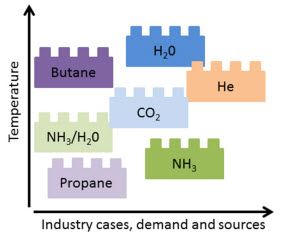
HeatUp
Research
The project acknowledges the lessons learned from past and will focus on natural working fluids. Ammonia, butane and water offer excellent thermal properties for refrigeration proposes while at the same time their Global Warming Potentials (GWP) and Ozone Depletion Potentials (ODP) are close to zero.
HeatUp is developing novel concepts for high temperature and high capacity heat pumps for the Norwegian and European industry. HeatUp hereby focuses on the utilization and upgrading of industrial surplus heat which is a significant and valuable energy sources. This sources is nowadays unused because of the lack of suitable high temperature heat pumps and long payback times. At the same time, the dependency on fossil fuels is reduced, which will clear the way towards a carbon-neutral green future. The project is focusing on the application of robust and compact key components and efficient heat pump cascades utilizing environmentally friendly refrigerants.
Selected industrial case studies are performed in close cooperation with the project's industrial consortium. The development of high temperature heat pumps applicable for the specific needs of different industries is a complex task where multi-disciplinary skills and close cooperation with industries nationally and internationally is required.

We have heard a great deal lately of the harmful effects to the environment when halocarbon refrigerants are lost to the atmosphere. This should not really have come as a surprise since similar problems have happened over and over again. Numerous cases are on record where new chemicals, believed to be a benefit to man, have turned out to be environmentally unacceptable, sometimes even in quite small quantities (DDT, PCB, Pb etc.).
In the present situation, when the CFCs and in a little longer perspective the HCFCs are being banned by international agreement, it does not seem very logical to try to replace them by another family of related halocarbons, the HFCs, equally foreign to nature.
Int. J. Refrig., Vol. 18, No. 3, pp. 190-197, 1995
Gustav Lorentzen, NTH
Publications
Conference Papers:
- Possibility for mechanical vapor re-compression for steam based drying processes.
Bantle, Michael; Tolstorebrov, Ignat; Eikevik, Trygve Magne. 1st Nordic Baltic Drying Conferanse, 17. – 19. June 2015, Gdansk Polen. Trondheim: NTNU. Institutt for energi- og prosessteknikk 2015 ISBN 978-82-92739-09-9 - An overview of European and international safety standards related to use of natural refrigerants as a working fluids for refrigeration and heat pump processes.
Eikevik, Trygve Magne; Tolstorebrov, Ignat; Bantle, Michael. 1st Nordic Baltic Drying Conference, 17. – 19. June 2015, Gdansk Polen. ISBN 978-82-92739-09-9 - Development and performance analysis of an object-oriented turbo-compressor model for steam compression cycles.
Bantle, Michael; Eikevik, Trygve Magne; Jokiel, Michael.I: 12th IIR Gustav Lorentzen Conference on Natural Refrigerants GL2016 : Proceedings. International Institute of Refrigeration 2016, 21.-24 August 2017, Edinburgh/UK, ISBN 9782362150180 - Evaluation of Natural Working Fluids for the Development of High Temperature Heat Pumps.
Opeyemi Bamigbetan, Trygve M. Eikevik, Petter Nekså, Michael Bantle, 12th IIR Gustav Lorentzen Conference on Natural Refrigerants GL2016 : Proceedings. International Institute of Refrigeration 2016, 21.-24 August 2017, Edinburgh/UK, ISBN 9782362150180 - Turbocompressor: Development, Modelling and Pilottests of a Mechanical Vapour Recompression for steam driers (in German).
Michael Bantle, Michael Jokiel and Mogens Weel, in Proceedings of Annual German Refrigeration Association Conference, 16th to 18th November 2016, Kassel, Germany.
Popular Science:
- Bilteknologi krymper energitap i industrien
Michael Gantle (Gemini, 23.11.2016) - Gjør gull av spillvarme
Michael Bantle, Petter Nekså: (Gemini, 07.07.2015) - HeatUp Newsletter
- Blog: Sommerforsker hos SINTEF Energi: Høy temperatur